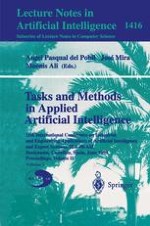1998 | ReviewPaper | Buchkapitel
CBR: Strengths and weaknesses
verfasst von : Pádraig Cunningham
Erschienen in: Tasks and Methods in Applied Artificial Intelligence
Verlag: Springer Berlin Heidelberg
Enthalten in: Professional Book Archive
Aktivieren Sie unsere intelligente Suche, um passende Fachinhalte oder Patente zu finden.
Wählen Sie Textabschnitte aus um mit Künstlicher Intelligenz passenden Patente zu finden. powered by
Markieren Sie Textabschnitte, um KI-gestützt weitere passende Inhalte zu finden. powered by
There is considerable enthusiasm about Case-Based Reasoning as a means of developing knowledge-based systems. There are two broad reasons for this enthusiasm. First, it is evident that much of human expert competence is experience based and it makes sense to adopt a reuse-based methodology for developing knowledge based systems. The other reason is the expectation that using Case-Based Reasoning to develop knowledge based systems will involve less knowledge engineering than alternative 'first-principles' based approaches. In this paper I explore the veracity of this assertion and outline the types of situation in which it will be true. CBR is perceived to have this knowledge engineering advantage because it allows the development of knowledge based systems in weak theory domains. If CBR can work without formalising a domain theory then there is a question about the quality of solutions produced by case-based systems. This is the other issue discussed in this paper and situations where CBR will and will not produce good quality solutions are outlined.
